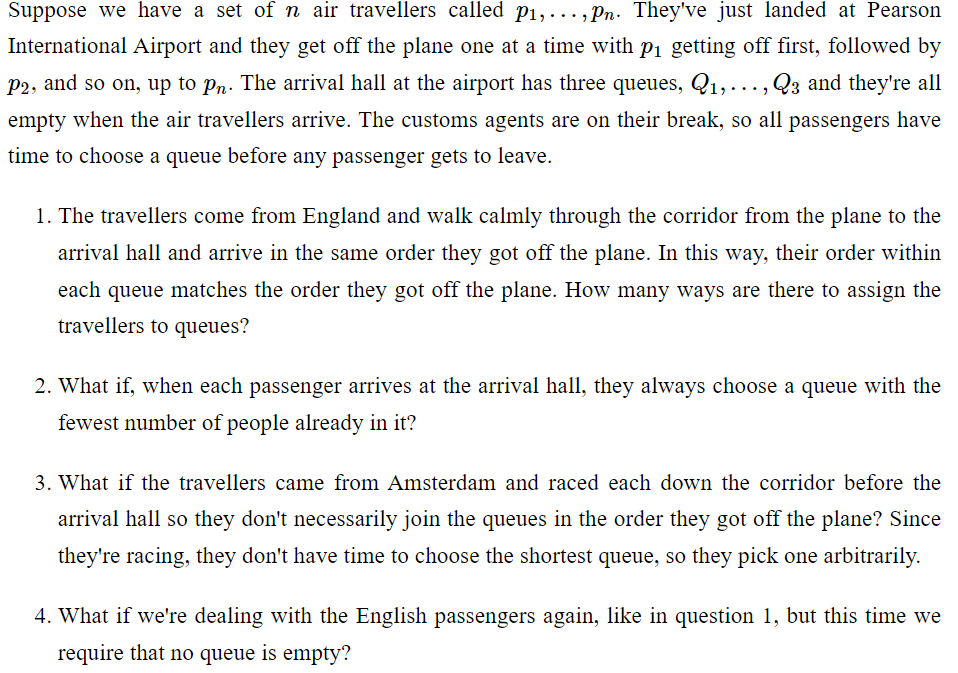Suppose we have a set of n air travellers called p₁,...,Pn. They've just landed at Pearson International Airport and they get off the plane one at a time with p₁ getting off first, followed by P2, and so on, up to Pn. The arrival hall at the airport has three queues, Q₁,..., Q3 and they're all empty when the air travellers arrive. The customs agents are on their break, so all passengers have time to choose a queue before any passenger gets to leave. 1. The travellers come from England and walk calmly through the corridor from the plane to the arrival hall and arrive in the same order they got off the plane. In this way, their order within each queue matches the order they got off the plane. How many ways are there to assign the travellers to queues? 2. What if, when each passenger arrives at the arrival hall, they always choose a queue with the fewest number of people already in it? 3. What if the travellers came from Amsterdam and raced each down the corridor before the arrival hall so they don't necessarily join the queues in the order they got off the plane? Since they're racing, they don't have time to choose the shortest queue, so they pick one arbitrarily. 4. What if we're dealing with the English passengers again, like in question 1, but this time we require that no queue is empty?
Suppose we have a set of n air travellers called p₁,...,Pn. They've just landed at Pearson International Airport and they get off the plane one at a time with p₁ getting off first, followed by P2, and so on, up to Pn. The arrival hall at the airport has three queues, Q₁,..., Q3 and they're all empty when the air travellers arrive. The customs agents are on their break, so all passengers have time to choose a queue before any passenger gets to leave. 1. The travellers come from England and walk calmly through the corridor from the plane to the arrival hall and arrive in the same order they got off the plane. In this way, their order within each queue matches the order they got off the plane. How many ways are there to assign the travellers to queues? 2. What if, when each passenger arrives at the arrival hall, they always choose a queue with the fewest number of people already in it? 3. What if the travellers came from Amsterdam and raced each down the corridor before the arrival hall so they don't necessarily join the queues in the order they got off the plane? Since they're racing, they don't have time to choose the shortest queue, so they pick one arbitrarily. 4. What if we're dealing with the English passengers again, like in question 1, but this time we require that no queue is empty?
Chapter8: Sequences, Series,and Probability
Section8.6: Counting Principles
Problem 74E: Lottery Powerball is a lottery game that is operated by the Multi-State Lottery Association and is...
Related questions
Question
how would i use product rule for question 1,2,3? and how do i do 4?

Transcribed Image Text:Suppose we have a set of n air travellers called p₁,..., Pn. They've just landed at Pearson
International Airport and they get off the plane one at a time with p₁ getting off first, followed by
P2, and so on, up to pn. The arrival hall at the airport has three queues, Q₁,..., Q3 and they're all
empty when the air travellers arrive. The customs agents are on their break, so all passengers have
time to choose a queue before any passenger gets to leave.
1. The travellers come from England and walk calmly through the corridor from the plane to the
arrival hall and arrive in the same order they got off the plane. In this way, their order within
each queue matches the order they got off the plane. How many ways are there to assign the
travellers to queues?
2. What if, when each passenger arrives at the arrival hall, they always choose a queue with the
fewest number of people already in it?
3. What if the travellers came from Amsterdam and raced each down the corridor before the
arrival hall so they don't necessarily join the queues in the order they got off the plane? Since
they're racing, they don't have time to choose the shortest queue, so they pick one arbitrarily.
4. What if we're dealing with the English passengers again, like in question 1, but this time we
require that no queue is empty?
Expert Solution
This question has been solved!
Explore an expertly crafted, step-by-step solution for a thorough understanding of key concepts.
Step by step
Solved in 4 steps with 22 images

Recommended textbooks for you


Elements Of Modern Algebra
Algebra
ISBN:
9781285463230
Author:
Gilbert, Linda, Jimmie
Publisher:
Cengage Learning,


Elements Of Modern Algebra
Algebra
ISBN:
9781285463230
Author:
Gilbert, Linda, Jimmie
Publisher:
Cengage Learning,